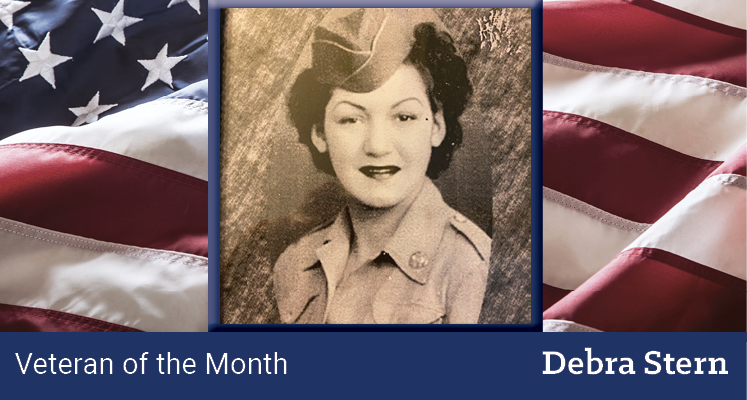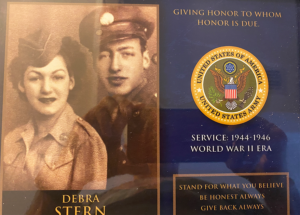Debra Stern: Veteran of the Month | November 2021

At 19 years old, Debra Stern eagerly ran to Grand Central Station to enlist in the United States Army during World War II. But, as a woman under 20, she needed her mother’s signature to join, which was difficult for her mother to do since she didn’t want her to go. Nevertheless, Stern persevered through sexism and sexual harassment to become one of the few women to oversee and drive, transporting ammunition and troops during WWII, even driving General Patton. Here is her story…
Debra Stern was born in Brooklyn, New York, in 1924. She was the oldest of two brothers. When Stern was ten years old, her mother gave birth to her youngest brother while struggling with tuberculosis, so Stern stayed home and took care of her newborn brother while her mother recovered. When asked about her hobbies while growing up, Stern laughed and stated, “I took care of my brothers!” Her parents were divorced, and Stern helped care for her younger brothers while growing up in New York. Stern graduated from East New York Vocational High School and at 16 years old.
Stern recollected, “We didn’t know about war like my sons did. We lived in peace; we weren’t rich but living.” She continued, “When the war came, everybody ran to help. That is why they call us the greatest generation because we were all eager to go.” Stern chose to enlist in the Army and was given the choice of where she could be stationed after basic. Stern chose Oglethorpe, GA, for basic training, which took approximately two months. During WWII, it was a significant training center for the Women’s Army Corps. Her training consisted of calisthenics, marching, and a lot of testing. The women did not participate in weapons training.
After basic training, Stern was sent to upstate New York to Camp Shanks. Stern explained, “They put me in the gas station because my family owned a gas station, but I told them I want to drive.” Stern described there was a Lieutenant who wanted to take her to his cabin, and she refused. Stern remarked, “He should’ve known not to be snotty with a New York girl because we were much wiser!” The Lieutenant decided to give her the test to drive, hoping it would allow him to take her back to his quarters. But what the Lieutenant didn’t know, the civilian inspector giving her the test, jumped in the truck asking what was going on between Stern and the Lieutenant. Stern told the inspector that he was only giving her the test to get her back to his cabin, and Stern remarked, “I am not that type of girl.” Stern disclosed what the inspector said, “The Lieutenant told me not to show you how to drive, but if you stay quiet and calm, I will talk you through everything.” Stern revealed, “It was a simple clutch, six by six truck that I drove all the way from New York to Maryland, and I listened to everything he said, not saying a word so I could follow his instructions, and I passed.” By getting her driver’s license, Stern was able to get out from under that Lieutenant’s command. The Lieutenant kept harassing Stern until the Colonel caught him in the hallway of the headquarters holding Stern up against the wall and asked, “Are you ok, Deb?” Stern explained that when the Lieutenant heard the Colonel call her by her name instead of her rank, he knew that the Colonel knew her well enough to use her first name, he stopped bothering her. Stern went on to say, “Otherwise, I loved the Army and what I was doing for them.”
Stern drove all types of vehicles, wagons, jeeps, trucks, and even buses during her time at Camp Shanks. Stern recollected how beautiful the area was while she was there. During her time in the Army, Camp Shanks was the largest embarkation camp used during World War II. Approximately 1.3 million troops came through Camp Shanks before heading overseas, and it was even given the nickname “Last Stop, USA.” Seventy-five percent of the troops that took part in the invasion of Normandy embarked from Camp Shanks. Stern met and drove a lot of men that wouldn’t make it back. Stern had to have a private room on the base because she had a radio in her room and would be called to drive at any hour of the day. There were times during her service that she would work forty hours straight without a break. Stern started off as a Corporal and worked her way up to a Sergeant at the demand of other male soldiers. Stern recalled the soldiers saying, “She is doing the work; she deserves it.” Stern carried out her military service in the United States, even being part of the last eight soldiers at Camp Shanks before it was closed.
Both of Sterns brothers went into the military as well. Her brother, two years younger than her, was radio reconnaissance in the Army. She recalled that her Colonel called her in to notify her that her brother was coming in and was given time off to see him. She conveyed, “Right away, the bells went off, and I knew if they were giving me time off to see him, he was going into hot water.” She wasn’t given any information on where he was being sent. Stern made it home before him, and as soon as he walked in the door, she grabbed him to go take a picture together in their uniforms in case anything were to happen to him. Her youngest brother was ten years younger and a pilot in the Air Force who flew the F100 fighter jet. Both of her brothers made it home safely after their time in the military.

Photo of Stern & her brother taken during their visit home in 1945.
Stern stated that the military gave her the chance to meet some fascinating people. For example, when General Patton came up to WestPoint north of camp, she drove him to the city. Her Colonel told her to take a car to pick someone up but didn’t say who it would be. She exclaimed, “I liked him!”
While home for R & R (rest & relaxation), Stern met her husband at a block party. He worked for the Coast Guard, and the couple was married in 1945 while Stern was still stationed at Camp Shanks. Once Stern returned to Camp Shanks after her wedding, she started feeling ill and visited the sick hall. The doctor asked if she had just gotten married and figured she was pregnant. Since Stern was up for a discharge, she decided she would rather accept her release and have children than stay in the Army. Stern continued with active duty through her pregnancy until she was honorably discharged in 1946, the same year her oldest son was born. After the military, the Sterns took many trips to Hawaii. Stern said, “I wanted to see the (USS) Arizona and the Schofield barracks because my cousin got bombed there. I wanted to climb a mountain, which I did.”
The Sterns had three sons and raised them on Long Island, NY, with their middle child still living in their family home today. Stern worked full-time while raising children and volunteering. She was always active as a volunteer with the Veteran Affairs and has belonged to three different Veterans groups. “I may have had a screw loose,” Stern said with a giggle about working her whole life. She is still volunteering at 97 years old, working on the archives, compiling the gravesites of all the Jewish veterans from the Civil War up to the present. “I have every order of the Jewish faith that is buried in France, Luxemburg, England, Netherlands, and Pearl Harbor and complied all the locations, names, and dates.” She went on to state, “I found a 16-year-old Mexican Jew that was killed at the Alamo.”
Stern talked about being invited to a dinner at the synagogue in North Carolina. They took her out back and showed her gravesites from soldiers who died in the confederacy. Stern immediately asked for a list of their names. She then sent letters to all the cemeteries in France, and they answered her. “I told them I was a veteran and gave them the story that we were working on the archives and said we were interested in finding all those of the Jewish faith that died.” She proudly stated that she got an answer when everyone else failed because she never said I. She continued, “I always said we would appreciate your help.” Stern has been working on this since 1984. In her research, she has found approximately 40,000 Jewish soldiers. As Stern told the stories of all the gravesites she had found, she could remember the names of specific individuals, what war they fought in, and where they were buried. The 97-year-old Stern exclaimed, “Maybe that’s why I am being kept alive.” She is currently working on corrupted files by matching up the correct information before returning it to The National Museum of American Jewish Military History (NMAJMH) in Washington, DC. According to their website, the NMAJMH documents and preserves the contributions of Jewish Americans to the peace and freedom of the United States, educates the public concerning the courage, heroism, and sacrifices made by Jewish Americans who served in the armed forces, and works to combat anti-Semitism. Stern does all of this as a volunteer stating, “No one, and I am very proud to say this, but no one tells me what to do.” She even pays for things out of her own pocket to get the job done. “And that is why they appreciate me,” she stated proudly. Stern has also held many roles as an officer in many organizations over the years. She can now announce that she was even a Congressional Aid for some time. Stern stated, “I enjoyed it, and it kept me busy and out of the gossip.”
In 1988 Stern and her husband retired and moved to Florida after being snowbirds for several years. She now has six grandchildren and her eighth great-grandchild on the way. She continues to work diligently at home on the archives. Stern exclaimed through a giggle proudly, “God kept me alive because he needed a worker.”
Veterans Care Coordination is proud to recognize Debra Stern for her service to our country. We are privileged to have the opportunity to share the stories of our nation’s heroes. Thank you for your service, Debra Stern.
